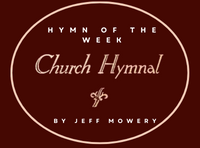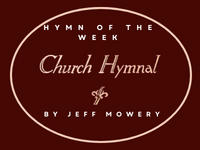At Even, Ere the Sun was Set
At even, ere the sun was set,
The sick, O Lord, around Thee lay;
O, with how many pains they met!
O, with what joy they went away!
Once more ’tis eventide, and we,
Oppressed with various ills, draw near;
What if Thyself we cannot see?
We know that Thou art ever near.
O Savior Christ, our woes dispel;
For some are sick, and some are sad;
And some have never loved Thee well,
And some have lost the love they had.
And some are pressed with worldly care
And some are tried with sinful doubt;
And some such grievous passions tear,
That only Thou canst cast them out.
And some have found the world is vain,
Yet from the world they break not free;
And some have friends who give them pain,
Yet have not sought a friend in Thee.
And none, O Lord, have perfect rest,
For none are wholly free from sin;
And they who fain would serve Thee best
Are conscious most of wrong within.
O Savior Christ, Thou too art man;
Thou has been troubled, tempted, tried;
Thy kind but searching glance can scan
The very wounds that shame would hide.
Thy touch has still its ancient power.
No word from Thee can fruitless fall;
Hear, in this solemn evening hour,
And in Thy mercy heal us all.
Once again, I have come across a hymn that I have no personal history with. Until recently, I had never heard, read, or sung it’s lyrics. Pastor Alistair Begg referenced this song in one of his sermons back in December. He frequently draws wonderful quotes from these old songs, and their poetry and beauty force me to include them in the “Hymn of the week.” This particular song entitled “At even, ere the sun was set” or more understandably, “At evening, before the sun was set” was written by Henry Twells in the late 1800’s. Mr. Twells worked as an instructor in a classroom in England, and one afternoon, while a student labored through one of his tests, the sun began to set below the horizon. Mr. Twells, inspired by the scene of the sun setting that afternoon, wrote this beautiful poem.
Couple of comments on the lyrics:
- “What if Thyself we cannot see? We know that Thou art ever near.” – In our world, there are times where we can’t see the Sun. The Sun sets each evening and hides its brilliance through the night. Even storm clouds at high noon, can cover the light, warmth and beauty of the Sun. But the truth is, the Sun hasn’t moved. It hasn’t changed. It is not less bright at midnight or during a terrible storm. The Sun is constant. God’s Son is no different. His light and beauty are no less dim because we can’t see Him working sometimes. His love and compassion are no less real, just because we may not feel their warmth. We know in our minds, and in our hearts, that He is ever near. He is right beside us. He sticks closer than a brother. He is unchangeable and will not forsake His children.
- “That only Thou canst cast them out.” – The author has a pretty exhaustive list of the problems we face in this world – sickness, sadness, worldly care, and doubt to name a few. These things can tend to discourage Christians and impact our walk with the Lord. But although the author lists several “ills”, he also tells us that there is only one cure. That is the Lord Jesus Christ. He is the only one that can heal. He is the only one that can truly gladden a heart. He is the only one who we can cast our burdens upon, and leave them there. He truly is the only one that can cast them out.
- “And some have friends who give them pain, Yet have not sought a friend in Thee.” – One of my favorite hymns is probably “What a friend we have in Jesus.” The story behind it, and the words contained it, are truly powerful. They are a reminder that the Lord is our friend. John 15:13-15 says “Greater love has no one than this: to lay down one’s life for one’s friends. You are my friends if you do what I command. I no longer call you servants, because a servant does not know his master’s business. Instead, I have called you friends, for everything that I learned from my Father I have made known to you.” The line in this hymn reminds me that sometimes I have taken my cares and concerns to “friends” before I have taken them to the Lord. You see, He is a kind compassionate friend. He is a friend that will tell you what you need to hear, not what you want to hear. His words are words of life and beauty. Not words of condemnation and criticism. I pray we seek this Friend while He may be found.
This particular hymn actually reminded me of being in Mr. Watson’s English class at Grant High School back in Oklahoma City. Not that his classroom had some picturesque view of SW Oklahoma City sunsets, but it reminded of Mr. Watson’s thoughts on poetry. One of the things that Mr. Watson taught me is that to truly appreciate great works of literature, you must read them a few times, and chew on their words, and digest what the author was trying to say. Sometimes you have to grab a dictionary and look up a word or two. Sometimes, you have to do your own translation in your language, or you will miss the author’s meaning.
This hymn, in my opinion, is so poetic and beautiful, but also can be like some literature – so hard to understand, that we miss some of the powerful truth found in it’s words. I realize this hymn is longer than normal (8 verses). I also realize that is not familiar and that it is not an easy read. But I encourage you to read it a few times. Like most great poetry, there are things that become clearer the more you read them. There are things the “Son” reveals in the morning, at noon, and at “even, ere the sun was set” and there is truth found in the beautiful words of this old hymn.

